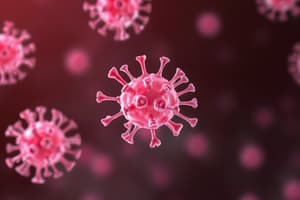Podcast
Questions and Answers
What are the two major types of hypersensitivity reactions involved in autoimmune diseases?
What are the two major types of hypersensitivity reactions involved in autoimmune diseases?
Type II and Type III hypersensitivity reactions.
Describe the chronic nature of autoimmune diseases.
Describe the chronic nature of autoimmune diseases.
Autoimmune diseases are chronic and progressive, characterized by relapses and remissions.
What factors can influence the signs and symptoms of autoimmune diseases?
What factors can influence the signs and symptoms of autoimmune diseases?
Age, hormones, and environmental factors can influence symptoms.
Name a common organ-specific autoimmune disease related to the thyroid.
Name a common organ-specific autoimmune disease related to the thyroid.
Identify a systemic autoimmune disease and mention its implication.
Identify a systemic autoimmune disease and mention its implication.
How do the clinical manifestations of autoimmune diseases impact their classification?
How do the clinical manifestations of autoimmune diseases impact their classification?
What role do autoreceptor antibodies play in autoimmune conditions?
What role do autoreceptor antibodies play in autoimmune conditions?
What is a significant characteristic of an individual with autoimmune diseases?
What is a significant characteristic of an individual with autoimmune diseases?
Which organs are commonly impacted by autoimmune diseases?
Which organs are commonly impacted by autoimmune diseases?
What distinguishes organ-specific from systemic autoimmune diseases?
What distinguishes organ-specific from systemic autoimmune diseases?
What leads to the breakdown of T cell anergy and the subsequent activation of T cells specific for self-antigens?
What leads to the breakdown of T cell anergy and the subsequent activation of T cells specific for self-antigens?
How can molecular mimicry result in autoimmune reactions?
How can molecular mimicry result in autoimmune reactions?
What role do polyclonal B cell activation play in autoimmunity?
What role do polyclonal B cell activation play in autoimmunity?
What are the implications of defective regulatory T-cell development in autoimmune diseases?
What are the implications of defective regulatory T-cell development in autoimmune diseases?
How does the release of sequestered self antigens contribute to autoimmune processes?
How does the release of sequestered self antigens contribute to autoimmune processes?
What is the association between HLA alleles and autoimmune diseases?
What is the association between HLA alleles and autoimmune diseases?
What are the mechanisms through which infections can precipitate autoimmune diseases?
What are the mechanisms through which infections can precipitate autoimmune diseases?
How does the familial incidence of autoimmune diseases emphasize the role of genetic factors?
How does the familial incidence of autoimmune diseases emphasize the role of genetic factors?
What happens when there is a failure of T cell-mediated suppression, such as in AIDS?
What happens when there is a failure of T cell-mediated suppression, such as in AIDS?
In what way does the presence of complex, multigenic patterns affect the understanding of autoimmune diseases?
In what way does the presence of complex, multigenic patterns affect the understanding of autoimmune diseases?
What is immunologic tolerance and how does it relate to autoimmunity?
What is immunologic tolerance and how does it relate to autoimmunity?
Distinguish between central tolerance and peripheral tolerance.
Distinguish between central tolerance and peripheral tolerance.
What role do regulatory T cells play in maintaining peripheral tolerance?
What role do regulatory T cells play in maintaining peripheral tolerance?
Explain how antigen sequestration contributes to self-tolerance.
Explain how antigen sequestration contributes to self-tolerance.
Identify the factors that contribute to the failure of self-tolerance in autoimmune diseases.
Identify the factors that contribute to the failure of self-tolerance in autoimmune diseases.
Describe the process of clonal deletion in central tolerance.
Describe the process of clonal deletion in central tolerance.
What is anergy in the context of peripheral tolerance?
What is anergy in the context of peripheral tolerance?
How do mutations in apoptosis genes relate to autoimmune lymphoproliferative disorders?
How do mutations in apoptosis genes relate to autoimmune lymphoproliferative disorders?
Illustrate how environmental factors may trigger autoimmune responses in genetically susceptible individuals.
Illustrate how environmental factors may trigger autoimmune responses in genetically susceptible individuals.
What clinical conditions can arise as a consequence of disturbances in immunologic tolerance?
What clinical conditions can arise as a consequence of disturbances in immunologic tolerance?
Flashcards are hidden until you start studying




